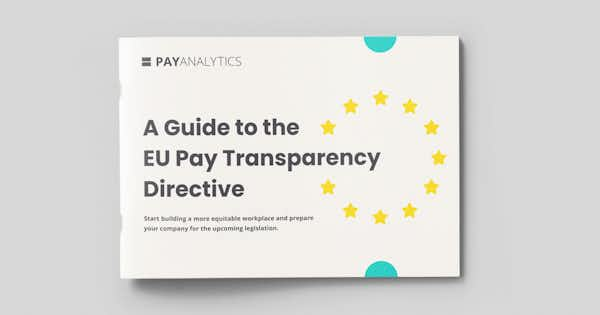Evróputilskipun um gagnsæi í launum | Sækja rafbók hér.
Mæla launabilið

Launagreiningar
Með því að skoða hvaða þættir hafa áhrifa á laun geturðu tekið betri ákvarðanir í framtíðinni.
PayAnalytics hugbúnaðurinn
Fáðu góða yfirsýn yfir launastrúktúr fyrirtækisins, skýra mynd af dreifingu starfsfólks, framkvæmdu launaúttektir, fylgdu reglugerðum og lokaðu launabilum - allt í einum hugbúnaði.
Launagreiningar
Skoðaðu þá þætti sem hafa áhrif á laun og taktu góðar ákvarðanir.
Virðismiðaður samanburður
Berðu saman mismunandi störf með tilliti til "jöfn laun fyrir jafn verðmæt störf".
Jafnréttisvísar
Framkvæmdu greiningar á starfsmannahópnum og fáðu innsýn í fjölbreytileika vinnustaðarins.
Hækkunartillögur
Fáðu sérsniðnar hækkunartillögur með PayAnalytics, byggðar að þínum þörfum.
Skýrslur
Fáðu hjálp við að uppfylla kröfur um skýrslugjöf, auk sveigjanleika til að útbúa sérsniðnar skýrslur.
Launaráðgjafinn
Fáðu aðstoð við að taka góðar launaákvarðanir og viðhalda launajafnréttinu.
Gagnastjórnun
Sjáðu launastrúktúrinn þinn myndrænt, og gerðu þær gagnabreytingar sem þú þarft.
Starfsmat
Berðu saman ólík störf og eiginleika starfsfólks byggt á stöðluðum og hlutlausum forsendum.
Aðgangsstjórnun
Stjórnaðu aðgöngum notenda eða búa til notendahlutverk sem samnýta aðgangsstillingar.
Nýtt

Ný Evróputilskipun um gagnsæi í launum
ESB hefur samþykkt nýja tilskipun um launagagnsæi. Aðildarríki ESB og EES þurfa að leiða hana í lög fyrir mitt ár 2026.
Yfirlit yfir fræðsluefni
Fræðsluefni um meðal annars launajafnrétti, launagagnsæi og fjölbreytileika og inngildingu (DEI).
Leiðarvísar
Við höfum tekið saman leiðarvísa um launajafnrétti, launagagnsæi og margt fleira.
Greinar og blogg
Greinar um launa- og vinnustaðajafnrétti, launagagnsæi, hvernig á að miðla upplýsingum um launajafnrétti og margt fleira.
Staðbundnar kröfur
Listi af kröfum sem gerðar eru til fyrirtækja um launajafnrétti í mismunandi löndum og landsvæðum.
Coffee Talk hlaðvarpið
Margrét Bjarnadóttir og Henrike von Platen fara yfir það nýjasta í launajafnréttis málum á 8 mínútum.
Árangurssögur viðskiptavina
Lestu um viðskiptavini sem hafa náð árangri með PayAnalytics.

Sameining PayAnalytics og beqom
PayAnalytics og svissneska hugbúnaðarfyrirtækið beqom hafa náð samkomulagi um kaup beqom á öllu hlutafé í PayAnalytics. Kaupin eru mikilvæg viðurkenning á lausn PayAnalytics sem er leiðandi á heimsvísu.
Um okkur
Hugbúnaðurinn okkar er byggður á yfir áratug af rannsóknum og þróun af verðlaunuðum prófessorum, launjafnréttissérfræðingum og verkfræðingum.
Störf
Viltu vinna með okkur? Við erum stöðugt að stækka.
Fréttir
Nýjustu fréttir um fyrirtækið, viðburði, árangurssögur viðskiptavina, fréttatilkynningar og margt fleira.
Vörumerki
Yfirlit yfir vörumerki PayAnalytics, verðlaun og sögu fyrirtækisins.
Samstarfsaðilar
Við vinnum m.a. með ráðgjafastofum, lögfræðisstofum og vottunaraðilum.
Ráðgjöf
Sérsniðin ráðgjöf um innleiðingu launajafnréttis sem styður við notkun PayAnalytics.
PayAnalytics hugbúnaðurinn
Fáðu góða yfirsýn yfir launastrúktúr fyrirtækisins, skýra mynd af dreifingu starfsfólks, framkvæmdu launaúttektir, fylgdu reglugerðum og lokaðu launabilum - allt í einum hugbúnaði.
Launagreiningar
Skoðaðu þá þætti sem hafa áhrif á laun og taktu góðar ákvarðanir.
Virðismiðaður samanburður
Berðu saman mismunandi störf með tilliti til "jöfn laun fyrir jafn verðmæt störf".
Jafnréttisvísar
Framkvæmdu greiningar á starfsmannahópnum og fáðu innsýn í fjölbreytileika vinnustaðarins.
Hækkunartillögur
Fáðu sérsniðnar hækkunartillögur með PayAnalytics, byggðar að þínum þörfum.
Skýrslur
Fáðu hjálp við að uppfylla kröfur um skýrslugjöf, auk sveigjanleika til að útbúa sérsniðnar skýrslur.
Launaráðgjafinn
Fáðu aðstoð við að taka góðar launaákvarðanir og viðhalda launajafnréttinu.
Gagnastjórnun
Sjáðu launastrúktúrinn þinn myndrænt, og gerðu þær gagnabreytingar sem þú þarft.
Starfsmat
Berðu saman ólík störf og eiginleika starfsfólks byggt á stöðluðum og hlutlausum forsendum.
Aðgangsstjórnun
Stjórnaðu aðgöngum notenda eða búa til notendahlutverk sem samnýta aðgangsstillingar.
Yfirlit yfir fræðsluefni
Fræðsluefni um meðal annars launajafnrétti, launagagnsæi og fjölbreytileika og inngildingu (DEI).
Leiðarvísar
Við höfum tekið saman leiðarvísa um launajafnrétti, launagagnsæi og margt fleira.
Greinar og blogg
Greinar um launa- og vinnustaðajafnrétti, launagagnsæi, hvernig á að miðla upplýsingum um launajafnrétti og margt fleira.
Staðbundnar kröfur
Listi af kröfum sem gerðar eru til fyrirtækja um launajafnrétti í mismunandi löndum og landsvæðum.
Coffee Talk hlaðvarpið
Margrét Bjarnadóttir og Henrike von Platen fara yfir það nýjasta í launajafnréttis málum á 8 mínútum.
Árangurssögur viðskiptavina
Lestu um viðskiptavini sem hafa náð árangri með PayAnalytics.
Um okkur
Hugbúnaðurinn okkar er byggður á yfir áratug af rannsóknum og þróun af verðlaunuðum prófessorum, launjafnréttissérfræðingum og verkfræðingum.
Störf
Viltu vinna með okkur? Við erum stöðugt að stækka.
Fréttir
Nýjustu fréttir um fyrirtækið, viðburði, árangurssögur viðskiptavina, fréttatilkynningar og margt fleira.
Vörumerki
Yfirlit yfir vörumerki PayAnalytics, verðlaun og sögu fyrirtækisins.
Samstarfsaðilar
Við vinnum m.a. með ráðgjafastofum, lögfræðisstofum og vottunaraðilum.
Ráðgjöf
Sérsniðin ráðgjöf um innleiðingu launajafnréttis sem styður við notkun PayAnalytics.
- Viðburður
Come and join us virtually for a conversation about equal pay: the fast changing legislation around the world, the role of analysis and data driven decision support, the equal pay journey and key levers to drive change - all packed into 90 minutes.
Margrét Bjarnadóttir from PayAnalytics will participate in a Reykjavik Global Forum 2020 digital session on Wednesday 11th November 09:30 UTC.
The name of the event is A Fair Diagnosis: It’s time to close the wage gap - FPI Lab and you can register using the registration link below.
- Fréttatilkynning
The Berlin based Fair Pay Innovation Lab (FPI) is piloting the Universal Fair Pay Check, a standardized international method of ensuring fair pay. FPI has chosen PayAnalytics as its partner for the Universal Fair Pay Check.
- Fréttatilkynning
Orkuveita Reykjavíkur og Landspítali munu ásamt nokkrum evrópskum brautryðjendum taka þátt í alþjóðlegri jafnlaunavottun á vegum Fair Pay Innovation Lab (FPI) í Berlín. PayAnalytics, sem gerir útbreiddasta jafnlaunahugbúnað á Íslandi, er samstarfsaðili FPI í verkefninu. Stærsta fyrirtækið sem tekur þátt í verkefninu er tryggingarfyrirtækið Allianz í Þýskalandi en það minnsta er markaðsstofan Rheingans Digital Enabler, þar sem starfsfólk telur einungis nokkra tugi.
- Frétt
Nordic Women in Tech Awards has nominated one of our founders, Margrét Bjarnadóttir, in the category Entrepreneur of the year. We are super proud of Margrét and thankful for the nomination! See the list of all Nominees here.
- Myndband
At the People Analytics & Future of Work conference in San Francisco last February Vidir Ragnarsson from Reykjavik Energy gave an insightful talk on how Reykjavik Energy tackled the task of measuring and closing their Gender Pay Gap within a few years.
- Frétt
Margret Bjarnadottir wrote for Ms. Magazine: We’re Not Waiting 200 Years to Close the Gender Pay Gap
The World Economic Forum estimates that it will take over 200 years to close the gender pay gap. No one should have the patience to wait that long. How can we accelerate change? The answer may lay in data and models with a good dose of transparency.
The journey starts with gathering the data and understanding the pay structure. Then companies move on to identifying areas for improvement and eliminating unexplained demographic pay gaps through corrective action—in other words, ensuring equal pay for equal work.
- Viðtal
Unnur Helgadóttir stjórnandi þáttarins á Mannauðsmáli tekur í sjöunda þætti þáttarins viðtal við Víðir Ragnarsson hjá Orkuveitu Reykjavíkur. Víðir er sérfræðingur í viðskiptagreind á mannauðssviði OR. Víðir fer meðal annars yfir það hvernig Orkuveitunni tókst að eyða launabili kynjanna og hvað þarf til að halda stöðunni þannig.
- Fréttatilkynning
Nýsköpunarsjóður atvinnulífsins hefur fjárfest fyrir 65 milljónir króna í hugbúnaðarfyrirtækinu PayAnalytics .
PayAnalytics hefur þróað jafnlaunalausn í skýinu sem hefur vaxið hratt á undanförnum árum. Lausnin er nú þegar notuð af rúmlega 50 fyrirtækjum og stofnunum á Íslandi sem samanlagt hafa yfir 30.000 starfsmenn, eða um 14% af íslenskum vinnumarkaði.
- Frétt
It is amazing to see one of our partners, the insurance company Sjóvá, perform so well. A company with 60% women on the board of directors and a female chair.
GEMMAQ rates companies in global markets based on how gender balanced their leadership is and is building a corporate gender equality and diversity rating and indexing system.
- Frétt
In a recent article, World-at-work set the spotlight on Reykjavík Energy and their pay equity work. Pay equity has been top-of-mind for Reykjavik Energy for quite some time, even before the topic was regularly making headlines.
- Fréttatilkynning
Landspítali hefur skrifað undir samning við PayAnalytics um notkun á hugbúnaði þess við jafnlaunagreiningar spítalans. Hugbúnaðarlausn PayAnalytics er notuð af fjölmörgum fyrirtækjum, sveitarfélögum og stofnunum til að styðja við faglegar launaákvarðanir.
- Viðtal
Margrét Vilborg Bjarnadóttir, stofnandi íslenska sprotafyrirtækisins PayAnalytics, hlaut nýverið aðalverðlaun alþjóðlegs þings Heimssamtaka frumkvöðla- og uppfinningakvenna (GWIIN). Hún ræddi við Kjarnann um hvernig stærðfræðin getur verið notuð sem vopn gegn launamun kynjanna, hvernig hægt er að hjálpa fyrirtækjum að lækka launabil sitt og karllægu akademíuna í Bandaríkjunum.
Skráðu þig á póstlistann okkar
Við sendum við og við út tölvupósta sem innihalda fréttir af starfseminni, áhugaverðar greinar um jafnlaunamál og tilkynningar um uppfærslur á hugbúnaði PayAnalytics.











